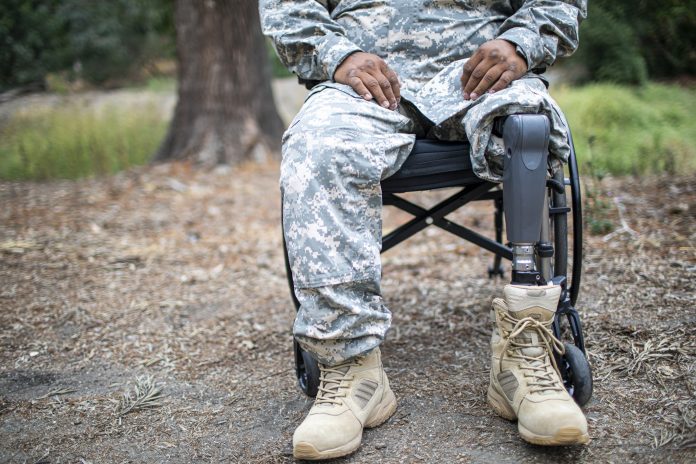Radii Devices, a small UK-based company, has taken steps to improve prosthetic care for veterans; this was made possible with the support of the Defence and Security Accelerator (DASA)
The subject was first brought to light by the University of Southampton in 2020; Radii Devices set out to address a concerning issue: how veterans with prosthetic limbs can better communicate the comfort of their sockets and improve their overall quality of life.
Improving the availability of prosthetic care for veterans
Veterans who rely on prosthetic limbs always have the same recurring question during appointments: “How comfortable is the socket?”.
However many veterans face daily struggles. The limited time of clinic visits and the challenge of articulating complex feelings like pressure points or discomfort results in fragmented data.
This gap can impact prosthetic optimisation, affecting mobility, comfort, and quality of life.
The Solution: A data-driven app to track prosthetic comfort
To address this challenge, Radii Devices developed a prosthetic monitoring application designed to track socket comfort continuously; the UK government released data to support this.
The app allows veterans to log daily activities, track comfort scores, and document specific issues as they occur. This real-time data collection helps prosthetists make timely adjustments, improving the fit and functionality of prosthetic limbs.
By thinking outside of the box and providing care other than clinical visits with a more data-driven approach, the app hopes to help veterans and improve their overall clinic visits, combined with the challenge of articulating complex feelings like pressure points or discomfort, resulting in fragmented data.
User-centered design
Radii Devices’ innovation process was built on strong collaboration with veterans and healthcare professionals.
Through DASA’s “Veterans’ Health Innovation Fund,” Radii Devices gained valuable support to conduct in-depth consultations with 20 stakeholders, including veterans and clinicians. These consultations provided insights into the real-world challenges prosthetic users faced and informed the app’s design.
The team also held collaborative design workshops, refining the app’s features through feedback from users and healthcare professionals to ensure it met their needs.
Testing and feedback
The app’s development progressed through multiple stages, from initial research to creating a user-friendly prototype. Early testing has received overwhelmingly positive feedback from veterans, who appreciate the app’s ability to capture the nuances of their daily experiences.
Veterans who previously struggled to communicate discomfort during appointments can now provide continuous, actionable data to their prosthetists.
This data-driven approach can potentially transform the prosthetic fitting process, make sure of better outcomes for veterans.
Expanding into global markets
DASA’s support played a key role in helping Radii Devices secure recognition beyond the UK.
One of the company’s most significant achievements was securing a contract with the US Department of Veterans Affairs (VA).
This partnership, facilitated by DASA and Innovate UK, has opened new opportunities for Radii Devices to contribute to a major healthcare transformation project to improve veterans’ prosthetic care.
Working alongside global technology leaders, Radii Devices is helping reshape the prosthetic fitting process and enhance the care veterans receive.
The impact of DASA
Radii Devices’ success story shows the power of strategic support for small and medium-sized enterprises (SMEs).
DASA’s funding and collaborative model helped the company move from an early-stage idea to an internationally recognised innovation.
By connecting Radii Devices with key partners like BLESMA, The Limbless Veterans, and the US VA, DASA allows the company to accelerate the development of its prosthetic monitoring app and scale its impact globally.
Setting new standards in prosthetic care for veterans
Radii Devices continues to refine its technology, hoping to reach new global standards for prosthetic care. By improving communication between veterans and their clinicians, the app can change the future of how prosthetic care is delivered.
With continued support and collaboration, Radii Devices is set to make lasting improvements to the prosthetic fitting journey, helping veterans regain comfort, mobility, and independence.
Radii Devices’ journey shows how targeted funding can help bring projects to life. With a strong dedication to improving the lives of veterans, Radii Devices’ is innovating within the field of prosthetics.
The success of Radii Devices shows how small UK SMEs can use support from initiatives like DASA to push innovation, expand into international markets, and create lasting change in key healthcare sectors.











